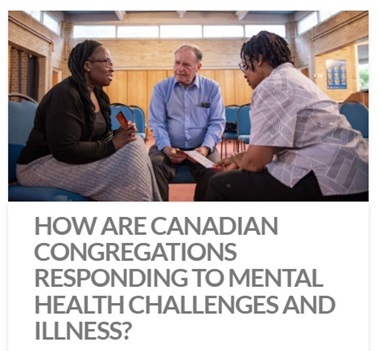 Sanctuary Mental Health Ministries and Flourishing Congregations Institute joined forces earlier this year to survey nearly 1,000 Canadian church participants in order to determine how effectively churches are responding to people experiencing mental health challenges and illnesses
Sanctuary Mental Health Ministries and Flourishing Congregations Institute joined forces earlier this year to survey nearly 1,000 Canadian church participants in order to determine how effectively churches are responding to people experiencing mental health challenges and illnesses
Following is a part of a November 18 summary by Sanctuary’s Social Media and Content Specialist Rachel Watson about what was discovered. The full report, ‘Mental Health and Illness in Canadian Congregations,’ will be published soon.
The good news is that many churches are already speaking about mental health in less harmful and stigmatizing ways.
Most individuals surveyed say that their churches are moving away from the idea that mental health challenges are solely a result of personal sin (16%) or demonic influence (13%). 70% of churches speak about mental health as “a normal part of the human experience” that can result from factors such as illness (65%) or a traumatic event (70%).
It’s encouraging to see that these ways of understanding and speaking about mental health challenges align closely with how individuals describe mental illness as well.
In the report, we refer to thin and thick understandings of mental health. A thin perspective provides minimal information about a person, without revealing the complexity of lived experiences and the diverse factors contributing to mental illness. A thick perspective takes the whole person into account, making room for the tensions, complexities, challenges and gifts that can come with lived experiences of mental health challenges.
The results of this survey suggest that churches have an opportunity to adopt a thicker view of mental health – one that embraces the full story of people’s lived experiences. When we asked individuals about the ways that mental health challenges are understood and spoken about in their church communities, churches were less likely than individuals to describe mental health challenges as a way to connect with God or as an experience that could enrich a person’s spiritual life.
Only 42% of churches link mental health challenges to social isolation – one of the biggest contributors according to mental health research. Churches are uniquely equipped to offer people supportive community and a sense of belonging, but this opportunity may be missed if the impacts of social isolation on mental health remain unacknowledged. While churches are making progress, they can continue deepening their perspective and understanding in more nuanced ways in order to understand and care for the people in their congregations well.
Go here for the full summary, and look forward to the full report coming out soon.
Sanctuary Mental Health Ministries is an ecumenical Christian organization. Based in Vancouver, they describe their mission in this way:
We provide resources that meaningfully engage the topics of faith and mental health. Our content is developed in collaboration with theologians, mental health professionals, and people with lived experience of mental health challenges. These resources prepare communities of faith around the world to raise awareness, reduce stigma, support mental health and promote mental wellbeing.
Flourishing Congregations Institute, based in Calgary, is:
an interdisciplinary, ecumenical research centre, currently housed at Ambrose University. We collaborate with scholars and practitioners from diverse disciplinary and theological traditions and institutions, across Canadian regions.
They released a recording October 25 (‘What Canadian Church Leaders Should Know About Mental Health and Illness in Their Congregation’), the first of a four-part webinar series.
